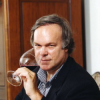Robert M. Parker, Jr.

Robert M. Parker, Jr.
Robert M. Parker Jr.is a leading U.S. wine critic with an international influence. His wine ratings on a 100-point scale and his newsletter The Wine Advocate, with his particular stylistic preferences and notetaking vocabulary, have become influential in American wine buying and are therefore a major factor in setting the prices for newly released Bordeaux wines. He is widely acknowledged to be the most widely known and influential wine critic in the world today...
NationalityAmerican
ProfessionCritic
Date of Birth23 July 1947
CountryUnited States of America
Wine to me is something that brings people together. Wine does promote conversation and promote civility, but it's also fascinating. It's the greatest subject to study. No matter how much you learn, every vintage is going to come at you with different factors that make you have to think again.
When I put my nose in a glass, it's like tunnel vision. I move into another world, where everything around me is just gone, and every bit of mental energy is focused on that wine.
The best Chateauneuf-du-Papes are among the most natural expressions of grapes, place and vintage. Chateauneuf-du-Pape vineyards are farmed organically or biodynamically, and the region's abundant sunshine and frequent wind (called 'le mistral') practically preclude the need for treating the fields with herbicides or pesticides.
As I've grown older, I've developed an appreciation for wines that are immediately gratifying but that can also provide great satisfaction over several years.
I think the Japanese love young, tannic red wines much more than most Americans do. Perhaps it is because Asians have a great fondness for tea, and tea is a very tannic beverage. Therefore a young, tannic red wine is something familiar to an Asian palate.
Back in 1990, there were fewer than 20 wineries in and around Paso Robles, a farming community midway between San Francisco and Los Angeles. Most of the wines produced there were rustic, highly tannic and alcoholic, with little charm or finesse.
You can't simplify my taste and say, 'Parker likes big wines,' because it's just not true.
As far as vintage Champagne goes, I loved 1990; it's a great, great vintage. I bought a lot of 1990 Blanc de Blancs Champagne - my favorite kind - and I plan on drinking it all by 2005.
I like white wine when it's young and vigorous. I don't think you should cellar white wine at all, unless it's white Burgundy, and definitely not nonvintage Champagne.
Generally speaking, when Australian winemakers try to make delicate, European-styled wines of finesse and lightness, the wines often come across as pale imitations of the originals. One exception is Australian Riesling, delicious, dry wines meant to be consumed in their first two years of life.
It's nearly impossible to believe just how provincial the wine world was in 1978, the year I launched my journal, 'The Wine Advocate.' There were no wines exported from New Zealand and virtually none from Australia (including Penfolds Grange, one of the greatest wines in existence).
Nineteen-eighty-two is a vintage of legendary proportions for all levels of the Bordeaux hierarchy. In short, it is a vintage which has produced the most perfect wines in the post-World War II era.
No scoring system is perfect, but a system that provides for flexibility in scores, if applied by the same taster without prejudice, can quantify different levels of wine quality and provide the reader with one professional's judgment.
What happens is that the people who are leaders in any field are copied. I mean, there's a reason why every wine newsletter tends to look like mine. They see someone who's been successful, so they sort of copy these same ideas.